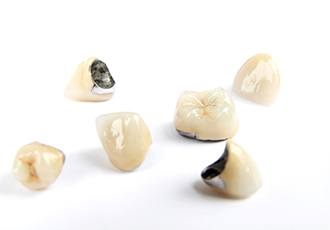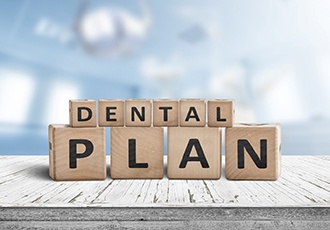Dental Crowns – Carrollton, TX
A Custom Restoration to Restore Your Smile

Our teeth are made of enamel, which is the strongest material in your body. However, this protective layer can still become decayed or damaged, exposing the sensitive inside portion of your tooth called the dental pulp. This typically causes pain and discomfort until your tooth is treated. When this damage is too severe for a regular filling, our team at Epic Family Dentistry of Carrollton uses dental crowns to restore your teeth to their full function and strength. To find out if a dental crown in Carrollton is right for you, contact our office to schedule an appointment.
What is a Dental Crown?

A dental crown is a custom-crafted “cap” that is made to fit over the biting surface of your damaged or weakened tooth above the gumline. This restoration can be made from many different materials, including gold, ceramic, and porcelain. Zirconia is a popular option by dentists because of its durability and natural appearance. Dental crowns are generally recommended in the following situations:
- Broken tooth that is in need of additional support
- Missing tooth that is being replaced with a dental implant
- Tooth that is severely misshapen or discolored
- Dental bridge that needs support from the adjacent teeth
- Tooth that has undergone root canal therapy
- Severe decay that’s been repaired with a large dental filling
The Process of Getting a Dental Crown

Typically, it takes two appointments for us to place your custom-made dental crown(s). During your first appointment, a small amount of dental structure will be removed to accommodate your crowns. This allows for your crown to fit perfectly over your tooth and between adjacent teeth. Then, we will take detailed images and precise impressions of your teeth to develop a dental crown that closely matches the appearance, size, and shape of your natural smile. In the meantime, you’ll be given a temporary crown to wear until your next appointment. Once your permanent restoration is made, you will come back for a second appointment where your restoration will be finalized.
The Benefits of Getting a Dental Crown

There are numerous benefits that you can expect to experience when you choose a dental crown to protect your compromised tooth. Here are some of the most prominent ones:
- Increased comfort
- Prevents future dental issues
- Natural appearance
- Customized for each patient
- Lifespan of 15 years or longer
- Allows for easy chewing
Understanding the Cost of Dental Crowns

One of the greatest things that dental crowns have to offer is their versatility. This allows them to treat all kinds of different problems and attend to a variety of different needs. However, it makes estimating what your dental crown is going to cost difficult without meeting you first.
That said, there are a few things you can keep in mind if you’re trying to budget for upcoming dental crowns. Here’s what you should consider.
Factors that Affect the Cost of Dental Crowns

The cost of your dental crown has to do with a few factors. First is the material of the crown that you’re getting; there are a variety of metal and ceramic options available to you, each of which has a different use and cost.
Then there’s the matter of the tooth itself, the damage to it, and whether any preliminary procedures need to be completed before your dental crown is placed. If you need a root canal or other treatment, this will need to be factored into the cost of your care.
Does Dental Insurance Cover Dental Crowns?

Dental crowns are major medical procedures that are done to deal with all kinds of issues. Provided that they’re done for necessary reasons, they’re usually well within the realm of what dental insurance will cover. Typically, dental plans will cover around 50% of the cost of a dental crown, though it’s still usually best to check beforehand what kind of coverage you’ll be able to get.
Other Options for Making Dental Crowns Affordable

Even if you don’t have dental insurance, there are methods of making dental crowns fit into your budget. We offer financing through CareCredit, a firm that offers low-to-no interest financing terms for patients who qualify. These can allow you to afford care now and pay it off later, giving you greater flexibility in payment.
Dental Crowns FAQs

Do you have decayed or damaged teeth? If so, then you might benefit from dental crowns in Carrollton. These restorations are specifically designed to repair the look and function of your pearly whites while seamlessly blending with the rest of your natural smile. Although you may be aware of the benefits you can enjoy from them, you may want to know as much as possible before committing to the treatment. That’s why our team has collected and answered some of the most commonly asked questions about dental crowns below. Read on to learn more, and give us a call if you don’t see the information you’re looking for!
Does It Hurt to Get a Dental Crown?
Like with most procedures, our team will be sure to numb your mouth so that you’re completely comfortable before starting. Sometimes patients only require a local anesthetic, but we can also provide sedation therapy to help you relax if you’re feeling anxious or nervous. While your tooth will be numbed during your preparation phase, this may not be necessary when placing your final crown. Once you have your restoration, you may experience mild sensitivity for the following few days. You can easily alleviate the discomfort with over-the-counter pain relievers as well as rinsing with lukewarm water.
Are Dental Crowns Permanent?
Dental crowns are not considered permanent, as you will eventually need to replace them. Still, they are an effective long-term solution for restoring decayed and damaged pearly whites. With proper care, you can expect them to protect your teeth for anywhere between 5 to 15 years! You should also remember that the preparation for a dental crown is irreversible, as your enamel will not grow back on its own. This means your teeth will need to have a crown for protection at all times. To make the most of your restoration, make sure to practice proper oral hygiene, maintain a healthy lifestyle, and visit your dentist every six months.
Do Dental Crowns Get Cavities?
A dental crown will not develop cavities. However, the underlying tooth as well as the rest of your pearly whites can still be vulnerable to plaque and bacteria buildup. In fact, a crowned tooth shares the same risk of decay as an uncrowned one. For this reason, you’ll want to maintain good dental hygiene to prevent harmful bacteria from attacking your enamel or accumulating along the gum line. Be sure to clean the base of your restoration regularly, as this is where plaque can enter and reach your natural tooth underneath. You’ll also want to visit our team for checkups and cleanings as well as stick to a well-balanced diet.
How Do You Know When a Dental Crown Needs to Be Replaced?
While your dentist will be the main one to determine if your dental crown needs replacing, there are several physical indications that you can watch out for. These may include:
- Discomfort: An underlying tooth that’s decayed may cause moderate to severe pain, which might require your restoration to be removed to address the cavity.
- Damage: Not only can a chipped or stained dental crown lower your confidence in your smile, but it can also put your underlying tooth at risk of injury.
- Instability: Your dental crown shouldn’t feel loose, especially when eating something hard or sticky. Make sure to contact our office right away if this happens so that we can fix or replace it.
